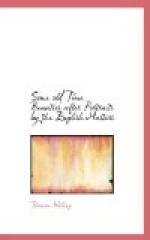Their “first night” was an auspicious success. The debut was applauded, and the players praised. They were adjudged fitted to star the social capital, so to London they went, in June, 1751. Their reception was magical. The West End went almost mad over them. When they appeared at Court, the aristocracy present was indecorous in its efforts to view the dominant beauties. Lords and ladies clambered on any eminence to gaze. The crowd surged upon them, and it was with difficulty they entered their chairs because of the mob outside. The gayety of Vauxhall Gardens was incomplete without them.
Their campaign was a short and eminently active one; Elizabeth triumphed first. At a masquerade at Lord Chesterfield’s, in February, 1752, James, the sixth Duke of Hamilton and Brandon, who was enamoured of the younger Irish girl, wished to marry her at once. A clergyman was asked to perform the ceremony then and there. He objected to the time and place and the absence of a ring. The Duke threatened to send for the Archbishop. With the ring of a bed-curtain, at half an hour past midnight, the wedding took place in Mayfair Chapel. The Scotch were enraged at the alliance, which became an unhappy one. The Duke was vulgar, debauched, extravagant, and “damaged in person and fortune,” yet, withal, insolently proud. He betook himself off within six years, and his two sons by the Duchess became, successively, seventh and eighth Dukes of Hamilton; and a daughter married Edward, twelfth Earl of Derby.
The dowager was less than a year in widow’s weeds when she exchanged them for more strawberry leaves. She had two ducal offers, from their graces of Bridgewater and of Argyll; she accepted the latter. In March, 1759, she married John, the fifth Duke of that name. Walpole’s comment on this was: “Who could have believed a Gunning would unite the two great houses of Campbell and Hamilton? For my part I expect to see Lady Coventry Queen of Prussia. I would not venture to marry either of them these thirty years, for fear of being shuffled out of the world prematurely, to make room for the rest of their adventurers. The first time Jack Campbell carries the Duchess into the Highlands, I am persuaded that some of his second-sighted subjects will see him in a winding-sheet with a train of kings behind him as long as those in Macbeth.” And again: “A match that would not disgrace Arcadia ... as she is not quite so charming as her sister, I do not know whether it is not better than to retain a title which puts one in mind of her beauty.”
The Dukes of Argyll—Lords of the Isles—have always shown a partiality for beauties as brides. This Duke’s father married the beautiful Mary Bellenden, daughter of John, Lord Bellenden,—
“Smiling Mary, soft and fair as down.”
* * * * *
She is mentioned otherwise as by Gay:—
“Bellenden we needs must praise,
Who, as down the stairs she jumps,
Sings ‘Over the hills and
far away,’
Despising doleful dumps.”




